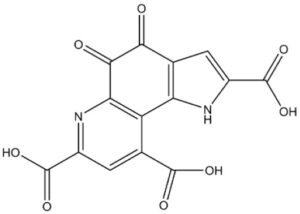
PQQ is short name of Pyrroloquinoline quinon, CAS: 72909-34-3. It is an essential nutrient that the human body must obtain from food. The world medical community calls it the 14th vitamin. PQQ is an oxidoreductase cofactor with the chemical formula C14H6N2O8. The molecular structure of PQQ is extremely complex, and due to its unique biological activity, it has become a hot topic of research in the fields of modern medicine and nutrition.

Basic information of PQQ
PQQ was first discovered in 1964 and has strong redox activity. PQQ is a complex that can bind to metals and exert biological activity in the body. In addition, PQQ can also participate in various redox reactions, mediating a series of cellular and molecular biochemical reactions as a coenzyme, thereby affecting the physiological and metabolic processes of the human body.
Source of PQQ
PQQ is widely present in nature, including many animals, plants, and microorganisms. In addition, it also exists in some common foods, such as beans, agaric, broccoli, grapefruit, and so on. For different purposes and purposes, PQQ can be produced in large quantities through different production methods, used as industrial raw materials and nutritional and health products.
Physiological functions of PQQ
1.Eliminate free radicals and resist oxidation
In the normal body, the production and clearance of free radicals are in dynamic equilibrium; When subjected to adverse stimuli, this balance is disrupted, resulting in excessive accumulation of free radicals and causing damage to cells. PQQ has a very powerful ability to scavenge free radicals, 50 to 100 times higher than ascorbic acid, and can directly play a role in clearing excess free radicals without relying on glutathione (GSH). Among them, PQQH2 in the reduced form can hinder the singlet oxygen reaction, reducing various reactive oxygen species (ROS), thereby avoiding oxidative damage to the body.
Due to its strong ability to scavenge free radicals, PQQ can effectively reduce the occurrence of myocardial infarction in organs such as the heart and brain during hypoxia, and has a good protective effect on liver tissue under oxidative stress conditions.
2.Inhibiting inflammatory response
Research has found that PQQ can inhibit NF- κ B (p65) is a response that triggers the mechanism, while inhibiting pro-inflammatory factors IL-6 and TNF- α The production of can alleviate neuroinflammation.
3.Regulating mitochondrial function
Mitochondria are substances that have functions such as preventing ROS damage, increasing energy metabolism, and prolonging lifespan. Research has shown that PQQ, along with bioactive substances such as flavonoids and resveratrol, can stimulate mitochondrial biogenesis and promote mitochondrial respiration. However, genistein and resveratrol are insoluble in water and have certain side effects when acting. PQQ is easily soluble in water and easy to absorb, and in vivo studies have found that adding micro molar concentrations or milligrams of PQQ per kilogram of diet is sufficient to stimulate mitochondrial biogenesis..
4.Antiapoptosis
Studies have shown that PQQ can effectively reduce the damage of glutamate or N-methyl-D-aspartate (NMDA) to hippocampal neurons and cerebral cortex, and inhibit the occurrence of cell apoptosis.




